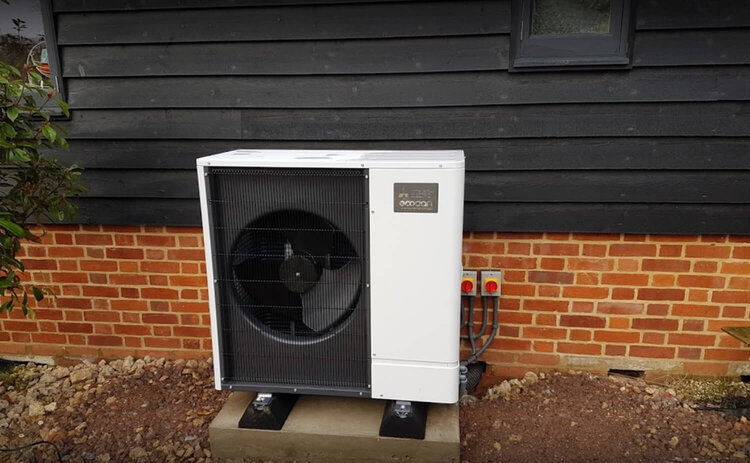Air Source Heat Pump, dream or NIGHTMARE?
When they moved to the Cotswolds countryside, Tony and Christine found their ideal home, but it had an Air Source Heat Pump, something they had zero experience of. In this episode, they share their experience of living with one. Was it a dream or a NIGHTMARE?
Tony Coe, Podcaster in Refinement
When Christine and I headed for The Cotswolds hills after COVID hit, the furthest things from our minds were air source heat pumps.
Nature told us it was time to leave Central London, our home and business location for many decades, and head out to the sanctuary of the countryside.
Listen to this episode: Escaping to the Country was a BIG refinement!
I LOVED everything about the house we found in The Cotswolds, except one, the heating system. Christine LOVED everything and wanted to buy it straight away.
But I said, “Hold your horses, sweetheart! I’ve heard bad things about these bloody Air Source Heat Pumps. I’m not sure they work! Let me do some research, hun!”
I’d been in the property business all my working life. None of my contacts had any experience of ASHPs. What I was able to find out (such as it was) didn’t fill me with confidence. On the other hand, I knew Christine wanted this house, come what may, and everyone knows it’s better to have a HAPPY wife, rather than just a wife!
So I put this question to Christine: “If we buy this house, are you prepared to wear thick jumpers and lots of layers to keep warm in winter because I suspect this new-fangled heating system won’t produce anything like the level of heat that you’re used to from the gas boilers you’ve been used to? And I think they’re expensive when they are running, so I think it will only give us background heating. Okay for you?”
Listen to this episode: Air Source Heat Pump, dream or NIGHTMARE?
Air Source Heat Pumps: A Guide for Homeowners
Air source heat pumps work by transferring heat from the outside air to the inside of the home, making them a more efficient and environmentally friendly alternative to traditional gas or oil-fired boilers.
How do air source heat pumps work?
Air source heat pumps use a compressor to move heat from the outside air to the inside of the home. The compressor works like a refrigerator, using electricity to power a refrigerant that circulates through a system of pipes. The refrigerant absorbs heat from the outside air and then releases it into the home.
How do air source heat pumps compare to gas and oil-fired boilers?
Air source heat pumps can be more efficient than gas or oil-fired boilers, meaning that they use less energy to provide the same amount of heat provided the home is well-insulated. This can lead to significant savings on energy bills, especially over the long term. Air source heat pumps are also better for the environment, as they produce no emissions provided the electricity is generated by renewable sources like solar, wind or hydro.
Who should get an air source heat pump?
Air source heat pumps are a good option for homeowners who want to save money on their energy bills and reduce their carbon footprint. They are only suitable for homes that are well-insulated and have high levels of air tightness.
It follows that air source heat pumps are not a good option for all homes. They are not suitable for homes that are poorly insulated or have low levels of air tightness. Additionally, air source heat pumps are more expensive to install than traditional gas or oil-fired boilers.
Costs
The cost of installing an air source heat pump varies depending on the size of the home and the type of system. The average cost of installation is around £10,000, but this can vary depending on all sorts of factors.. Air source heat pumps may be eligible for government grants.
Running costs
If your home is right for an air source heat pump (well-insulated and air tight) the running costs should be much lower than for a traditional gas or oil-fired boiler.
Alternatives
There are a number of other renewable energy technologies that can be used to heat, including ground source heat pumps, solar thermal panels and biomass boilers. Ground source heat pumps are similar to air source heat pumps, but they use heat from the ground instead of the air. Solar thermal panels use the sun's energy to heat water, which can then be used for heating and hot water. Biomass boilers burn biomass fuels, such as wood pellets or woodchips, to generate heat.
Conclusion
Air source heat pumps are a clean, efficient and cost-effective way to heat and cool homes. They are a good option for homeowners who want to save money on their energy bills and reduce their carbon footprint given a well-insulated, air tight home.
#AirSourcePumps #EcoFriendlyHeating
#RenewableEnergy #GreenEnergySolutions #HeatingEfficiency #SustainableLiving
#EnergySavings #CarbonFootprintReduction #HeatingTechnology #AlternativeHeating
#GreenHomeHeating #AirToWaterHeatPumps #HeatingInnovation
#EnvironmentallyFriendly #EnergyEfficientHomes #HeatingSolutions
#RenewableHeating #CostSavings #ClimateAction #GoGreen #HomeRenewables



Comments
Post a Comment